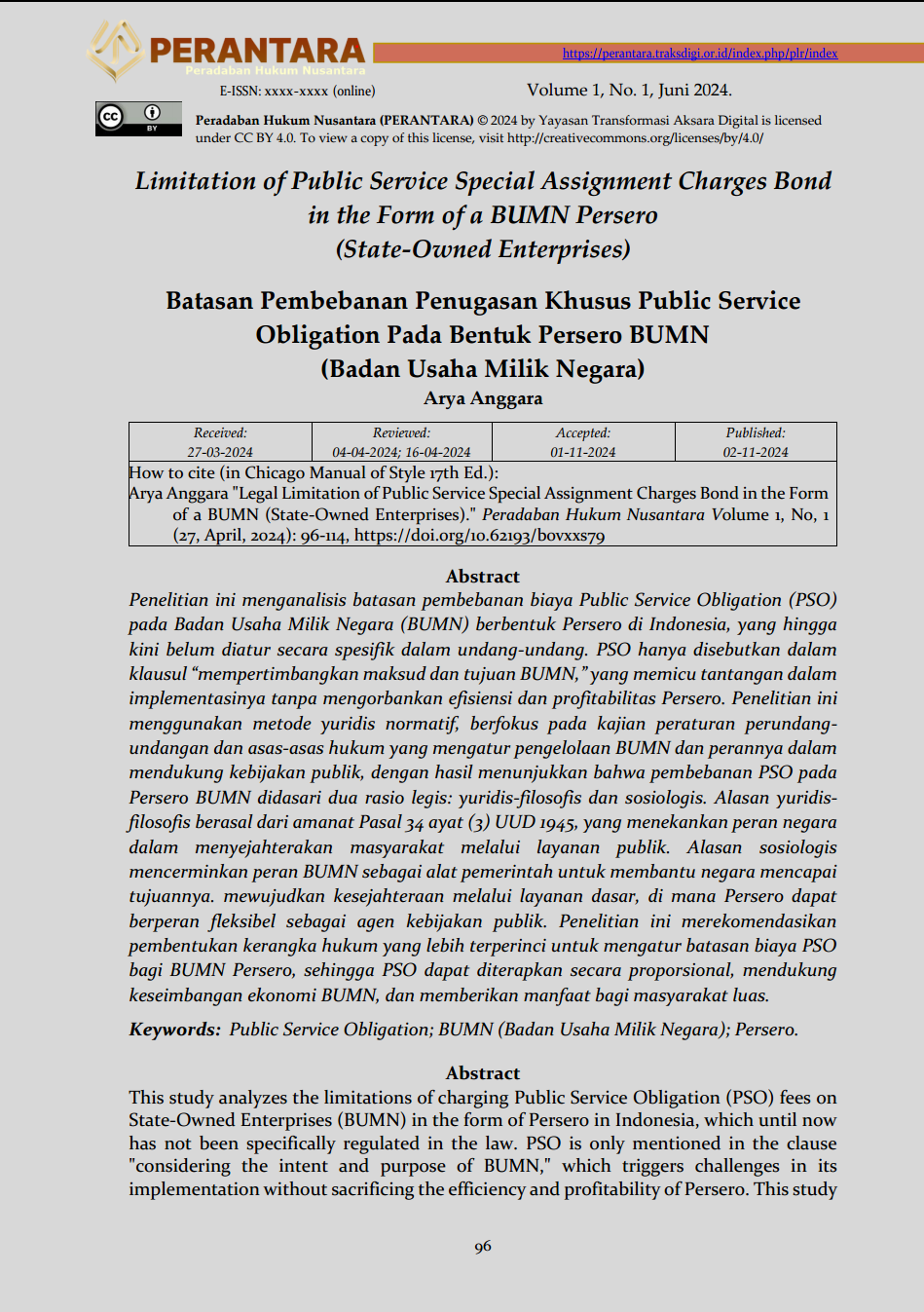Limitation of Public Service Special Assignment Charges Bond in the Form of a BUMN Persero (State-Owned Enterprises)
Batasan Pembebanan Penugasan Khusus Public Service Obligation Pada Bentuk Persero BUMN (Badan Usaha Milik Negara)
DOI:
https://doi.org/10.62193/ebsdrm65Keywords:
Public Service Obligations, State-Owned Enterprise, PerseroAbstract
This study analyzes the limitations of charging Public Service Obligation (PSO) fees on State-Owned Enterprises (BUMN) in the form of Persero in Indonesia, which until now has not been specifically regulated in the law. PSO is only mentioned in the clause "considering the intent and purpose of BUMN," which triggers challenges in its implementation without sacrificing the efficiency and profitability of Persero. This study uses a normative legal method, focusing on the study of laws and regulations and legal principles governing the management of BUMN and its role in supporting public policy, with the results showing that the imposition of PSO on BUMN Persero is based on two legal ratios: legal-philosophical and sociological. The legal-philosophical reason comes from the mandate of Article 34 paragraph (3) of the 1945 Constitution, which emphasizes the role of the state in improving the welfare of the community through public services. The sociological reason reflects the role of BUMN as a government tool to help the state achieve its goals. realizing welfare through basic services, where Persero can play a flexible role as an agent of public policy. This study recommends the establishment of a more detailed legal framework to regulate PSO cost limits for BUMN Persero, so that PSO can be implemented proportionally, support the economic balance of BUMN, and provide benefits to the wider community.
Downloads
References
Adebayo, Adeyemi, dan Barry Ackers. “Comparing corporate governance practices of state-owned enterprises (SOEs) in South Africa and Singapore.” Journal of Accounting and Investment 23, no. 1 (31 Januari 2022): 170–95. https://doi.org/10.18196/jai.v23i1.13830.
Ahmad, Ahmad, S. H. Absori, Aidul Fitriciada Azhari, dan S. H. Hamdan Zoelva. “Tafsir Konstitusi: Studi Putusan Mahkamah Konstitusi tentang Hak Menguasai Negara atas Sumber Daya Alam dalam Prespektif Demokrasi Ekonomi.” PhD Thesis, Universitas Muhammadiyah Surakarta, 2020. https://eprints.ums.ac.id/id/eprint/88056.
Amiruddin, Abidin Zainal. “Pengantar Metode Penelitian Hukum Jakarta: Raja Grafindo Persada.” Cet. Ke-1, 2006.
Amirudin, dan Zainal Asikin. Pengantar metode penelitian hukum. Jakarta: PT Raja Grafindo Persada, 2016.
Ansari, Muhammad Insa. “Penugasan Pemerintah pada Badan Usaha Milik Negara Sektor Ketenagalistrikan Dalam Perspektif Hukum Korporasi.” Padjadjaran Jurnal Ilmu Hukum (Journal Of Law) 4, no. 3 (2017): 551–68. http://jurnal.unpad.ac.id/pjih/article/view/13927.
Asnawi, M. Iqbal, Jacek Zalesny, Radhali, dan Andi Rachmad. “Review of the Legal Certainty of Management of the Company’s Bumn by the Board of Directors in State Financial Mechanisms.” Journal of Legal, Ethical and Regulatory Issues 27, no. 4 (2024 2023): 1–20. https://heinonline.org/HOL/Page?handle=hein.journals/jnlolletl27&id=436&div=&collection=.
Badan Keahlian DPR RI. “Draft Naskah Akademik Rancangan Undang-Undang Tentang Badan Usaha Milik Negara.” DPR RI, 2021. https://berkas.dpr.go.id/puuekkukesra/na/file/na-106.pdf.
Cindawati, Cindawati. Hukum Dagang dan Perkembangannya. Palembang: CV. Putra Penuntun, 2015.
Hadhikusuma, R. T. Sutantya Raharja, dan Sumantoro Sumantoro. Pengertian pokok hukum perusahaan: bentuk-bentuk perusahaan yang berlaku di Indonesia. Jakarta: Raja Grafindo Persada, 1996.
Handayani, Ika Apri, Suartini Suartini, dan Fokky Fuad. “Konsep Materialitas Dalam Aksi Korporasi Anak Cucu BUMN Berdasarkan Undang-Undang Perseroan Terbatas.” Binamulia Hukum 12, no. 2 (2023): 393–402. https://doi.org/10.37893/jbh.v12i2.618.
Irwansyah, Irwansyah. Penelitian Hukum: Pilihan Metode & Praktik Penulisan Artikel. Yogyakarta: Mirra Buana Media, 2021.
Kirana, Rosita Candra. “Studi Perbandingan Pengaturan Tentang Corporate Social Responsibility Di Beberapa Negara Dalam Upaya Perwujudan Prinsip Good Corporate Governance.” Thesis, UNS (Sebelas Maret University), 2009. https://digilib.uns.ac.id/dokumen/15832/Studi-Perbandingan-Pengaturan-Tentang-Corporate-Social-Responsibility-Di-Beberapa-Negara-Dalam-Upaya-Perwujudan-Prinsip-Good-Corporate-Governance.
Muhammad, Abdulkadir. Hukum perusahaan indonesia. Cetakan ke 4. Bandung: Citra Aditya Bakti, 2010.
Nurwenda, Mirna, dan Dedi Junaedi. “The Analysis of Financial Reporting in Ministries/State Institutions and Supervision of BUMN for Transparency & Accountability.” Jurnal Sistem Informasi, Akuntansi dan Manajemen 4, no. 1 (31 Januari 2024): 93–100. https://doi.org/10.54951/sintama.v4i1.684.
Pinker, Robert. The Idea of Welfare. London: Routledge, 2019.
Posner, Richard A. “Utilitarianism, Economics, and Legal Theory.” The Journal of Legal Studies 8, no. 1 (Januari 1979): 103–40. https://doi.org/10.1086/467603.
Pranoto, Toto. “Privatisasi, GCG, dan Kinerja BUMN.” Lembaga Management FE UI, 2010. https://www.academia.edu/download/35255802/Privatisasi_BUMN.pdf.
Pratiwi, Iranisa Dwi Resti. “Mendorong Peningkatan Penerimaan Bagian Pemerintah Atas Laba BUMN.” Pusat Analisis Anggaran dan Akuntabilitas Keuangan Negara DPR RAPBN APBN IV, no. 1 (2019): 1–15. https://pa3kn.dpr.go.id/produk/index-buletin-apbn/page/21.
Suseno, Irit, Sudarsono, A. Mukthie Fadjar, dan Sihabudin. “Forms of Ideal Laws of State-Owned Enterprises in Harmony with Article 33 Paragraph IV of the Preamble of the 1945 Constitution of the Republic of Indonesia.” Journal of Law, Policy and Globalization 85 (2019): 99. https://doi.org/10.7176/JLPG.
Tunggal, Imam Sjahputra, dan Amin Widjaja Tunggal. Membangun Good Corporate Governance (GCG). Jakarta: Harvarindo, 2002.

Downloads
Published
Issue
Section
License
Copyright (c) 2024 Arya Anggara (Author)

This work is licensed under a Creative Commons Attribution 4.0 International License.
https://creativecommons.org/licenses/by/4.0















